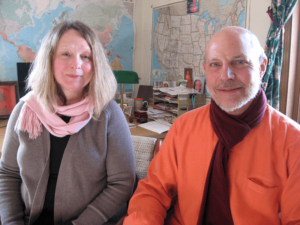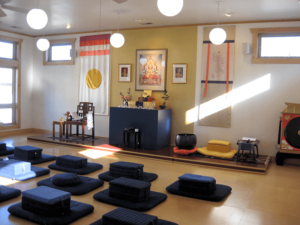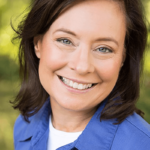Do you really feel that your life is a joyful one? Do you want to know about yourself in a deeper sense? If those questions resonate with you, meditation might hold some answers.
That advice comes from Swami Ritavan Bharati, teacher and spiritual head of The Meditation Center. Located at 631 University Ave. NE, it is one of at least four meditation and yoga centers in the Northeast area.
This story profiles The Meditation Center and the Shambhala Center of Minnesota, 2931 Grand St. NE. (The Northeaster previously featured two others: the Science of Spirituality Meditation Center, 4054 Van Buren St. NE, Columbia Heights, and Compassionate Ocean Zen Center, 652 17th Ave. NE, in our February 8 edition.)
The Meditation Center
The Meditation Center in Northeast Minneapolis was one of the country’s first meditation centers. It dates back to the 1960s, when University of Minnesota teacher Swami Veda Bharati attracted a following of students who wanted to learn about meditation. He established The Meditation Center in 1970, and the group bought St. Boniface Catholic Church’s former convent building.
The Meditation Center “has served the greater Twin Cities for nearly 50 years with the wisdom of the 5,000 year old Himalayan Yoga Tradition,” according to its brochure. It offers training in Raja Yoga, which is “an integrated scientific experiential approach to improving a person’s ability to skillfully use mind and body in everyday life.”
The center charges fees for most of its classes. It takes donations and sells books, CDs and videos in its bookstore. Class offerings include hatha yoga, pranyama yoga, meditation yoga, and biofeedback. Swami Ritavan said that teachers use machines that record heart rate and respiration to determine one’s stress level. “Biofeedback gives you a tool to become self-aware. What are your needs, your stresses?” he asked. “Do you need more balance in your lifestyle? We offer the steps of meditation.”
Phyllis Vargas is The Meditation Center’s office administrator. She also is a student. “Someone can come here and find all the tools available to us for working with body, breath and mind,” she said. “You can learn who you are and know yourself in fullest sense. The natural impulse of that awareness means that you, in your own expression, will be able to help others.”
The center offers meditation classes and a six-week series on hatha yoga. There are Thursday night “sampler” sessions that include hatha yoga, guided meditation, speakers, a vegetarian meal, and evening prayers and chants. Special events include lectures and workshops. The center also has weekend silence retreats, summer silence retreats and personal retreats.
Although he is the center’s spiritual head, Swami Ritavan said that he now spends only a few weeks a year in Minnesota. He primarily lives in Rishikesh, India, at a complex in the Himalayas called “Swami Rama Sadhaka Grama,” the Village of Spiritual Seekers, founded by Swami Rama. “We bring groups to our headquarters in India, and we have our own ashram,” (a center for retreat) Swami Ritavan said.
When he is away, five instructors in Northeast teach classes, help with members’ spiritual needs, and oversee the center. A seven-member board of directors meets monthly to discuss fundraising and outreach. The center opens its doors during Northeast’s annual art crawl, Art-A-Whirl, offering free hatha yoga and meditation sessions. The Meditation Center has a table at the summer Farmer’s Market in St. Boniface’s parking lot, and advertises its classes and workshops in newspapers and local business and church newsletters.
Currently, the building is getting a facelift. Workers are replacing lights, carpeting and windows, and refinishing the walls and ceiling. They also took out a wall to enlarge the center’s bookstore. “After 100 years, it’s overdue,” Swami Ritavan said. “We expect completion by the end of March. It will be very lovely.” The first floor has a large “puja” room for classes, the bookstore, a front office and a kitchen. Swami Ritavan’s office and several other rooms are on the second floor.
The center’s website, www.themeditationcenter.org, lists classes, workshops and events; the phone number is 612-379-2386.
Shambhala Center of Minnesota
Eleven years ago, The Shambhala Center’s members commissioned a modest, house-sized building on Grand Street NE in the Marshall Terrace neighborhood. The center’s yoga and meditation classes attract about 100 people a week, according to center director Katherine Engel, and special events and celebrations sometimes attract people from all over the country.
“Our general demographic includes a wide age range, from older people to teenagers,” she said. “They are not necessarily from Northeast, or even from the Twin Cities. There are not a lot of Shambhala centers in the Midwest. Some people come from Michigan, North Dakota, and Wisconsin.
Engel said that The Shambhala Center of Minnesota started operations in 1979. “Shambhala focuses on a person’s basic goodness, which is analogous to Buddha’s nature. Every being has this as its fundamental core.”
According to the center’s literature, Shambhala teachings are based on the legendary kingdom of Shambhala, a society that fostered the inherent goodness of is people. Shambhala’s lineage is Tibetan; its founder was Vidyadhara Chogyam Trungpa Rinpoche, who fled from Tibet in 1959 and went to England.
“Beginning in the 1970s, he began to present a societal vision based on the Shambhala principle that proclaims the inherent goodness of all humanity,” reads the brochure. “If humanity wished to create a better world, it would need to base its approach on global respect for fundamental human dignity.” The Shambhala Center is part of a global community of meditation and retreat centers on nearly every continent.
Engel said that the center’s interior has a Tibetan influence, with iconography, prayer flags and an elaborate shrine. “It is quite different from a Zen Buddhist center, which typically is very plain.”
Members come to the center for a sense of community, she said. Monday evening “fresh start” sessions are relaxed and inviting to newcomers. “We have basic yoga, basic sitting, basic contemplation and conversation. We break into pairs and have tea and cookies.”
Sunday morning sessions are more traditional; they include meditation instruction, sitting and walking meditation, and opening and closing chants. Sometimes, they might include yoga. “On Sundays we have people who are trained as meditation leaders. We also have time keepers.” (Although some of the teachers are paid, most of the staff at the center are volunteers.)
On Tuesday nights, the Shambhala School of Buddhist Studies offers a series of classes, which run six weeks at a time. On Wednesdays, there are book studies and a sitting meditation practice.
The Shambhala Center offers “An Introduction to Meditation” class on the first Saturday of the month; although it is free, registration is requested.
“There are many different opportunities to tap into meditation, and opportunities to explore working within the context of your own life,” Engel said. Also, she added, “This particular center has the reputation of doing food well. There are celebrations and social gatherings. We observe holidays. Some are solstice or equinox-based. We celebrate the Tibetan New Year and the Lunar New Year. We have a Midsummer Day picnic and a Harvest of Peace for the fall equinox.” According to its on-line calendar, March 5, the center celebrated The Year of the Fire Bird.
The Shambhala Center of Minnesota supports itself by class fees and donations. “Most classes have a charge, depending on how many sessions there are and who the teacher is,” she said. “We have a ‘pay what you can afford’ policy.”
Engel said that the center has a six-member council; each member generally serves three terms. “We’ve had great success working on a consensus model. We try to make sure that every voice is genuinely heard.”
The center’s website is www.minneapolis.shambhala.org and its phone number is 612-377-7737. E-mail is shambhalamn@gmail.com.
Below: Phyllis Vargas and Swami Ritavan, and the interior of the Shambhala Center. (Photo by Gail Olson) Katherine Engel (Photo provided)


